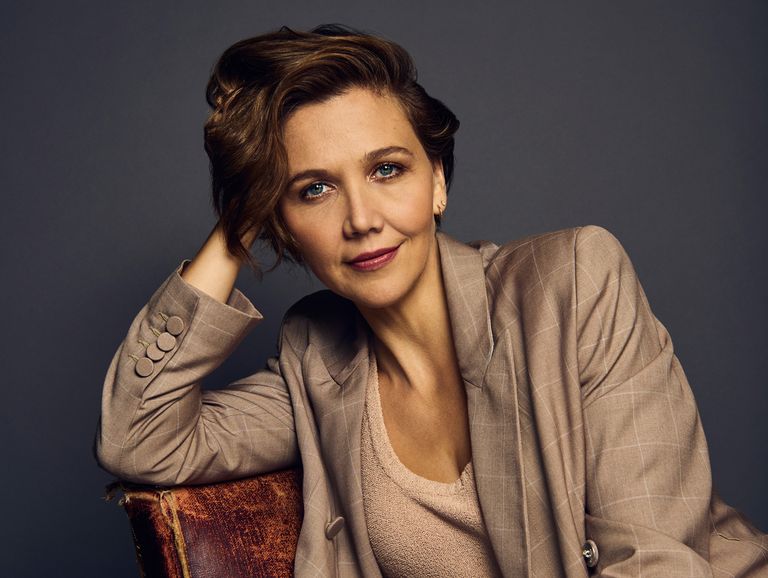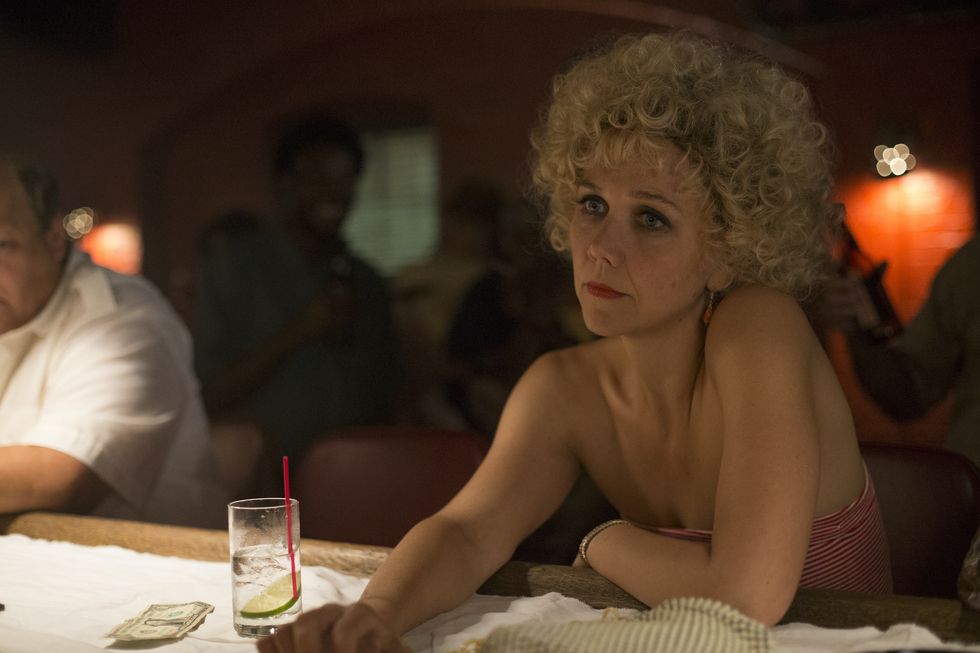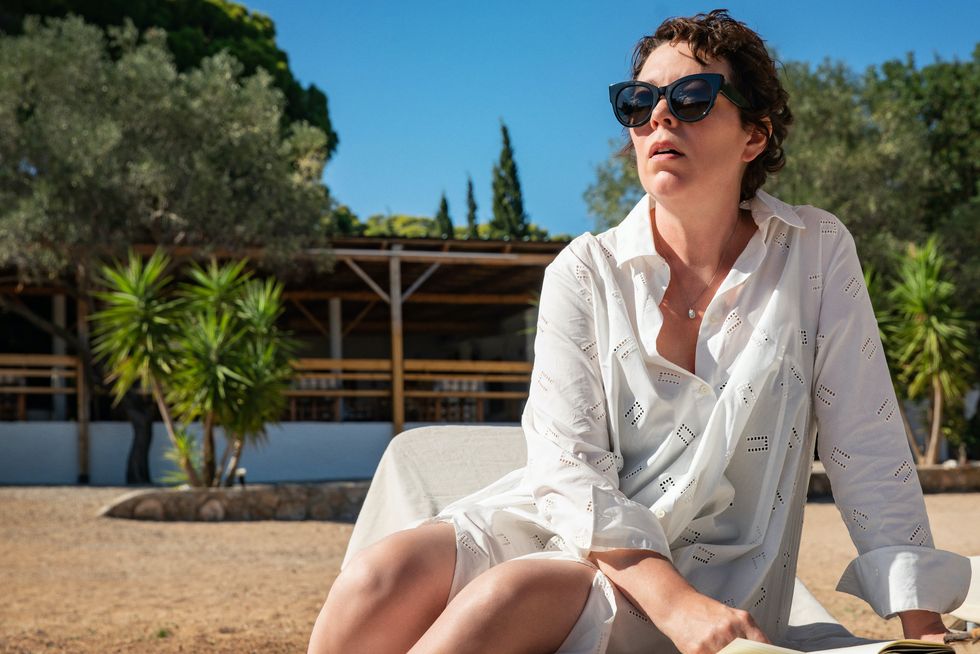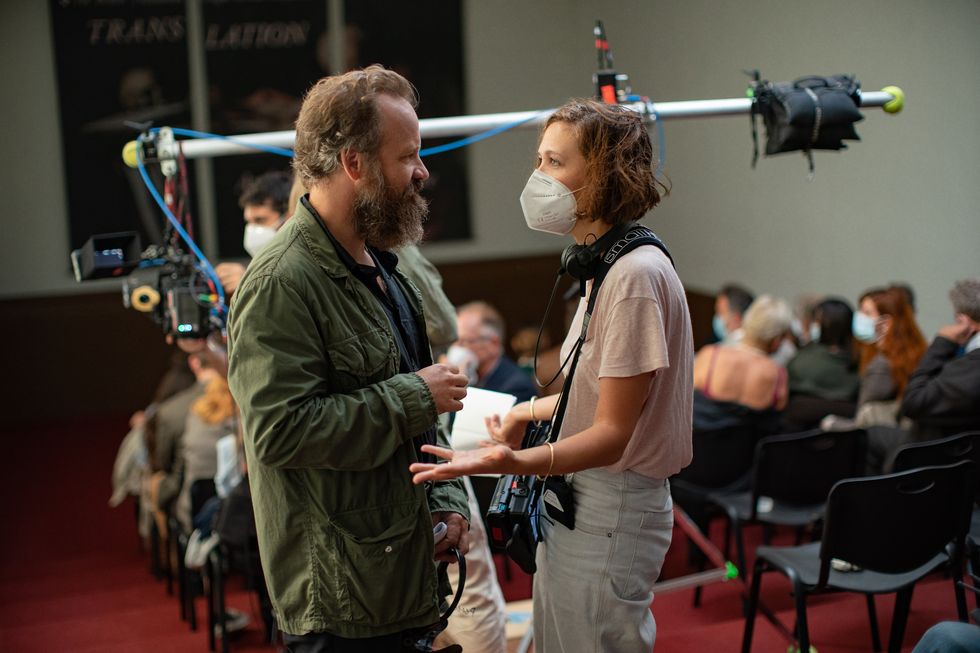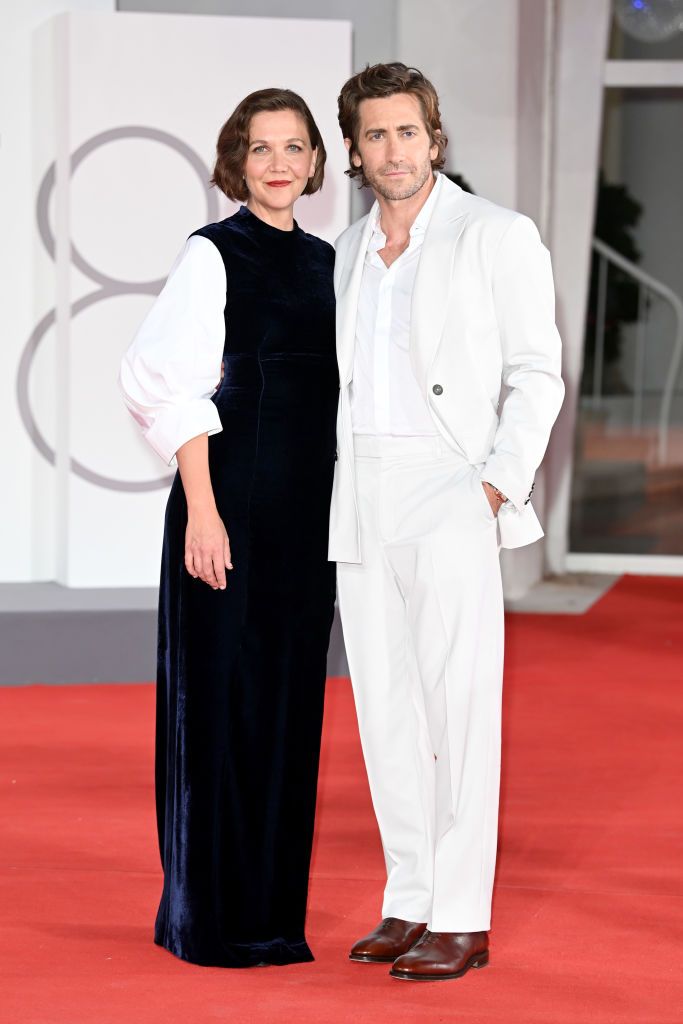Maggie Gyllenhaal has always had a voice. It just wasn't always heard.
‘Rarely, I would feel satisfied,’ sighs the Oscar-nominated star, talking us through her illustrious two decades-long acting career. ‘So much of the time, I had to make huge compromises about how much of my mind was able to make it into my work. And I just got tired of it.
'I did Secretary when I was 22 and that was a really great experience. I was working with a director who was interested in me as an artist. But I learned, after that, painfully, that there aren't many directors that are excited by an actress who’s full of ideas.’
So, she changed her course, and went behind the camera. We're speak over Zoom hours before the Oscar-nominated actor presents her directorial debut The Lost Daughter at the London Film Festival. Weeks later and the film has garnered five Gotham awards (including breakthrough director), the best Screenplay award at Venice Film Festival, three Golden Globe nominations (including Best Director) and whispers of Oscar nominations ahead of a mighty awards season.
Gyllenhaal has always approached her work with the mentality of a director. She has cultivated new arcs of portraying women on screen for two decades, from her 2002 breakout role in Secretary to her Emmy-winning performance in The Honourable Woman, right up until recently when she played a sex worker-turned-director in HBO’s The Deuce. But, in the early stages of her career as a woman in Hollywood, Gyllenhaal didn’t entertain the thought of physically stepping into the director's chair.
'I don't think I really allowed myself to consider that possibility. It's kind of sad to admit it, but I didn't feel entitled to want [to direct] when I was younger. When I was growing up, there were some outliers who were super brave and women who were directing films, of course. But, mostly, if you were interested in film, if you were a storyteller and you were a woman, the easiest track was to say, "I'm an actress, I'm a thinking actress. I'm an actress with a point of view."
The feeling had been brewing for decades, growing stronger with every instance where Gyllenhaal was unable to speak up. Then, it was 2016, and Gyllenhaal was galvanised following one specific incident where she - and the world - witnessed an entitled man’s misogynist behaviour go entirely without repercussions.
‘I do think that Donald Trump being elected had something to do with me becoming a director,’ she explains. ‘In that, two weeks before the election, he could say whatever disgusting thing he said about “grabbing women's p*ssies” and have there be absolutely no consequences to it. Not only that, but he's then elected president? It radicalised me politically, but also emotionally… things started to shake up inside me and I began thinking, “what do I really want?” And then I started to write.’
Gyllenhaal was among the many adoring fans of the enigmatically anonymous author, Elena Ferrante. Gyllenhaal admired how she - we assume Ferrante is female, Gyllenhaal stresses to me multiple times that she is none the wiser on the author’s anonymous identity - approaches the controversial and taboo while also maintaining a degree of empathy with her characters. With The Lost Daughter tackles one of the most notorious societal taboos, and one rarely depicted on screen with the nuance of Gyllenhaal’s screenplay, the regret of motherhood.
On screen, we follow a holidaying professor, Leda (Olivia Colman) who after witnessing an incident with a young mother (a career-defining performance by Dakota Johnson) is forced to confront past decisions through a series of flashbacks. Gyllenhaal knew she wanted Colman – ‘an actress in another stratosphere’ – from the onset. Over lunch, Colman then suggested fellow Brit Jessie Buckley to play her younger self. That weekend Gyllenhaal went by herself to watch Buckley’s 2019 film Wild Rose at a cinema in New York and was captivated by her. She also noted similarities between Buckley’s role and Gyllenhaal’s 2006 performance in Sherrybaby. ‘There are so many similarities which I felt even then. I keep saying Jessie is like a sister, I felt like we were kindred acting spirits.’
Practising what she preaches, Gyllenhaal was conscientiously receptive to her actors' interpretations of their characters and did this especially with Johnson. ‘Dakota read the script, came to me and said, “I want to go deep. I want to try something I've never tried before, and I want to do it with you.” And I took her by the hand and said, “Great, let's go.”... Ultimately, I was free. And I tried to create an environment where everybody else felt free.’
Gyllenhaal’s own experience of motherhood – she is a parent to two daughters – informed the script too. ‘I've been a mother for 15 years, so I’m in the middle of it. I have some experience now. And I think even from the moment that they're born, the spectrum of feelings is huge. There’s ecstasy and joy and this unfathomable connection on one side. And on the other side, there's real terror and anxiety.’
The father to Gyllenhaal’s children and her husband of 12 years Peter Saarsgard stars in the film too, and also subconsciously influenced the writing. ‘I guess I know him more deeply than I know any other man. And that helps so much to understand the men in the film,’ she smiles.
Ferrante granted Gyllenhaal the rights to adapting The Lost Daughter after the actor wrote a considered letter asking permission. The permission was granted publicly in The Guardian (which Brooklyn-based Gyllenhaal was alerted to by her British friends over excited transatlantic messages) - on the condition that it was Gyllenhaal herself who directed it.
Gyllenhaal’s entry to directing comes during a new wave of recognition for women filmmakers. In 2021, Chloé Zhao became the second woman ever, and the first woman of colour, to walk away with a Best Director Oscar. That same year, Emerald Fennell was awarded for her screenplay, Promising Young Woman. At the London Film Festival, Gyllenhaal is one of several women showcasing their projects, including Jane Campion’s The Power Of The Dog and Rebecca Hall’s Passing, while Olivia Wilde's Booksmart follow-up Don't Worry Darling is one of the most anticipated films of 2022.
Considering why this ‘sea change’ is happening now, Gyllenhaal refers to another female-made project, Fleabag: ‘It blew up because Phoebe Waller-Bridge was talking about things that were really honest. People do respond to the truth.’
Aside from her peers, Gyllenhaal’s inspiration comes from her famous family too. She is, of course, elder sister to Jake – who needs no introduction – daughter of director Stephen and director and screenwriter, Naomi Foner. Along with ‘everyone in my life who means something to me’, both her mother and brother played a part in The Lost Daughter, providing notes during the writing, shooting and editing stages. Jake – in particular – influenced the sound. ‘I don't know if you know this about him, but he's got really terrible eyesight, he wears contact lenses, but it’s really bad. Having lived like that has made him really tune in to sound and when I showed him my first cut he had the notes… It changed the way I thought about starting out on that [sound] process… Jake really opened that door to me.’
When I ask about the Gyllenhaal siblings being each other’s ‘toughest critics’, noting Jake’s quips inferring so in the past, it’s played down. ‘I wouldn't say that he's a tough critic. Like the handful of people who I look to as mirrors for my work, he's full of love, as a critic, which is one of the reasons why I sometimes ask for his thoughts.’
Given the mounting critical acclaim and buzz The Lost Daughter is generating, months ahead of the haze of awards season, it’s surely inevitable that this is not a one-off directing stint for Gyllenhaal. But, that's not to say she’s closing the door on acting just yet, it's just that now Gyllenhaal knows her boundaries. ‘I do think I will act again. I just don't want to have to compromise so much.’
The Lost Daughter is out in UK cinemas on December 17.

